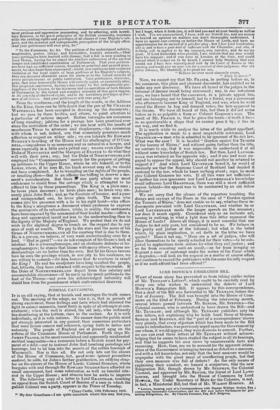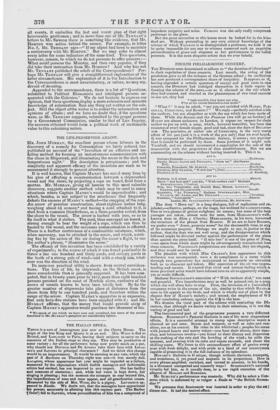LORD HOWICK'S EMIGRATION BILL.
WANT of room alone has prevented us from taking earlier notice of Mr. TENNANT'S Letters*, which ought to be carefully read by every one who wishes to understand the defects of Lord Howtcx's Emigration Bill. It appears by this correspondence, that a draft of the Bill was forwarded to Mr. TENNANT, before the 21st of January. The Bill was brought into the House of Com- mons on the 22nd of February. During the intervening month, several letters passed between Mr. SENIOR, Mr. STEPHEN—the Colonial counsel, who is understood to have drawn the Bill—and Mr. TENNANT; and although Mr. TENNANT publishes only his own letters, not explaining why he holds back those of Messrs. Selma and STEPHEN, still the "part of a correspondence"shows very plainly, that every objection which has been made to the Bill since its introduction, was previously urged upon the Government by one whom, it would appear, they were desirous to consult. Further, no one can read these letters of Mr. TENNANT without acknow- ledging that he seems to have studied the subject in all its bearings, and that he supports his own views by unanswerable facts and reasoning. How, then, are we to account for the apparent infatu- ation of the Government in bringing forward so defective a measure, and with a full knowledge, not only that the best measure would be unpopular with the great mass of unreflecting people, but that , their own measure was full of defects ? As the only means of explaining their conduct, we hazard a conjecture, that the new Emigration Bill, though drawn by Mr. STEPHEN, the Colonial 'Counsel, and approved by Mr. SENIOR, the friend of Lord LANS- DOWNE, and brought into the House of Commons by Lord Haericx, the Under Secretary of State for the Colonies, is not, in fact, a Ministerial Bill, but that of Mr. WILMOT HORTON. At
• Letters, forming part of a Correspondence with Nassau William Senior, Esq ; concerning Systematic Colonization, and the Bill now before Parliament for pro- moting Emigration, &c. By Charles Tennant, Esq. ALP. Ridgway.
all events, it embodies the last and worst plan of that right honourable gentleman ; and in more than one of Mr. TENNANT'S letters to Mr. SENIOR there is something like evidence, that Mr. HORTON was active behind the scenes. For example, in letter No. 7, Mr. TENNANT says—" If my object had been to maintain a controversy with Mr. HORTON." But we may refer to almost every letter for some indication of the same kind. Two questions, however, remain, to which we do not presume to offer answers :— What could possess the Ministry, not then very popular, if they did take their instruction from Mr. HORTON ? And why has not Mr. TENNANT published the whole of the Correspondence? Per- haps Mr. TENNANT will give a straightforward explanation of the latter circumstance. His explanation of it in the Introduction to the Correspondence is most unsatisfactory, or rather, we may say, devoid of meaning. Appended to the correspondence, there is a list of" Questions, submitted to Political Economists and intelligent persons ac- quainted with the Colonies." We do not hesitate to express our opinion, that these questions.display a more extensive and accurate knowledge of colonization than any thing yet written on the sub- ject. Still the object of the writer is to collect the information and opinions of others ; and we have no doubt that, if the questions were, as Mr. TENNANT suggests, submitted to the proper persons by a Government Commission, similar to that of Law Inquiry, the answers obtained would form a political work of inestimable value to this colonizino. nation.



























 Previous page
Previous page